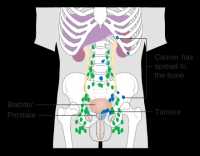
14 Nov Advanced Prostate Cancer: Androgen-Receptor Testing May Guide Selection of Treatment
MedicalResearch.com Interview with:

Prostate cancer that has metastasized to the bone: Wikipedia Image
Vincenza Conteduca, MD, PhD
Istituto Scientifico Romagnolo per lo Studio e la Cura dei Tumori (IRST) Srl – IRCCS
Meldola , Italy
MedicalResearch.com: What is the background for this study? What are the main findings?
Response: In our previous publications, we showed that the study of plasma cell-free DNA holds promise for improving treatment choice in metastatic castration-resistant prostate cancer (mCRPC). Specifically, we demonstrated that the detection in plasma of aberrations (copy number alterations and/or point somatic mutations) of androgen receptor (AR), using an easy and robust multiplex droplet digital PCR method, predicted an adverse outcome in mCRPC patients treated with second-generation AR-directed therapies (abiraterone or enzalutamide) in both settings: chemotherapy-naïve and post-docetaxel.
This current multi-institution work builds on our previous discoveries. We investigated the association of androgen receptor status and survival in men treated with docetaxel. Moreover, we performed an exploratory analysis in patients treated with docetaxel or AR-directed therapies as first-line therapy.
Interestingly, we observed that plasma AR-gained patients do not have a worse outcome compared to AR-normal patients when treated with docetaxel as first-line therapy. This introduces the opportunity to use plasma to select for docetaxel in preference to androgen receptor-directed therapies in AR gained mCRPC patients.
MedicalResearch.com: What should readers take away from your report?
Response: Metastatic castration-resistant prostate cancer patients treated with first-line therapy showed that plasma AR normal status favored treatment with abiraterone or enzalutamide while patients with plasma AR gain had a better response to docetaxel. Therefore, androgen receptor testing in plasma may have clinical utility for treatment selection in advanced prostate cancer, especially in the current complex context of CRPC due to the presence of several approved and ongoing life-prolonging available therapies for the treatment of advanced prostate tumour.
MedicalResearch.com: What recommendations do you have for future research as a result of this work?
Response: Our findings certainly have the main limitation of the retrospective design of the study. However, they constitute the logical next step in the plasma AR biomarker road-map and support the conduct of a prospective trial where plasma AR informs on the treatment decision. Prof. Gerhardt Attard and his team has recently been awarded peer-reviewed funding from Prostate Cancer UK to conduct this prospective trial in plasma AR aberrant chemotherapy-naïve CRPC (the PARADIGM trial, Plasma AR Analysis to DIrect the manaGement of Metastatic CRPC) that will represent the first prospective biomarker-based study using cell-free AR for a “personalized” treatment in mCRPC patients.
Citation:
Plasma Androgen Receptor and Docetaxel for Metastatic Castration-resistant Prostate Cancer
Conteduca, Vincenza et al.
European Urology , Volume 0 , Issue 0
[wysija_form id=”3″]
[last-modified]
The information on MedicalResearch.com is provided for educational purposes only, and is in no way intended to diagnose, cure, or treat any medical or other condition. Always seek the advice of your physician or other qualified health and ask your doctor any questions you may have regarding a medical condition. In addition to all other limitations and disclaimers in this agreement, service provider and its third party providers disclaim any liability or loss in connection with the content provided on this website.
Last Updated on November 14, 2018 by Marie Benz MD FAAD
